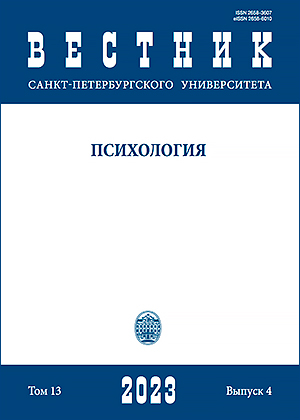Features of subjective well-being and coping strategies in women during periods of soft and hard social transitivity
DOI:
https://doi.org/10.21638/spbu16.2023.406Abstract
The relevance of the study is determined by large-scale, overlapping, multidirectional changes throughout the world over the past few years, which create a situation of social transitivity with heterogeneous periods. The concept of social transitivity is analyzed, in which heterogeneous periods are distinguished. The aim of the work is an empirical study of the specifics of subjective well-being, psychological defenses and coping strategies in women in situations of hard and soft social transitivity. The study involved 318 women (N=318), living in different cities of Russia aged from 26 to 55 years. The study was conducted in 2022 in two stages — during periods of soft and hard transitivity. The results obtained prove the importance for subjective well-being, psychological defenses and the choice of coping strategies for experiencing a person’s current situation as a crisis. The specificity of the links between subjective well-being and psychological defenses and coping strategies has been revealed both for groups with different experiences of the current situation and for different periods of transitivity. It is shown that rigid transitivity erases almost all differences between those who assess the current situation of social transitivity as a crisis and those who for whom it is not. It has been established that the greatest contribution to the maintenance of subjective well-being is made by the psychological defense “denial”, and these connections have their own specifics in two groups for different periods of transitivity. Few links were found between coping strategies and subjective well-being, among them positive links between the coping strategy “positive reformulation and personal growth” and subjective well-being in a group of women who assess the situation as a crisis, and the number of these links decreases in a situation of rigid transitivity. The results obtained contribute to the development of the problem of the psychological well-being of an individual in a situation of social and personal transitivity
Keywords:
subjective well-being, coping strategies, social transitivity, personal transitivity, rigid transitivity, fluid transitivity
Downloads
References
References
Downloads
Published
How to Cite
Issue
Section
License
Articles of "Vestnik of Saint Petersburg University. Psychology" are open access distributed under the terms of the License Agreement with Saint Petersburg State University, which permits to the authors unrestricted distribution and self-archiving free of charge.




